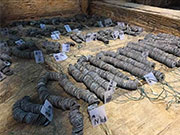

 |
| File photo |
BEIJING, Nov. 27 -- The three satellites launched this year for China's indigenous satellite navigation system are sending twice as many signals as their predecessors, said the system's designer, after completing tests on the new units.
The 18th and 19th satellites for the Beidou Navigation Satellite System (BDS), which is being developed as an alternative to U.S.-operated GPS, were sent into space on July 26, and the 20th on Sept. 30.
While they are less than half the weight of earlier generations, the new satellites' output is greater, matching the best around the world, said the China Academy of Space Technology in its latest newsletter.
After tests of their orbits and key technology, they are working as intended and in all weather, according to the academy.
The 18th and 19th BDS satellites are the first that can communicate with each other, helping with distance measurements, said Wang Ping, chief engineer on the project.
China began to build the BDS in 1994, two decades after the United States developed GPS. China plans to complete a constellation of 35 satellites, achieving global coverage, by 2020.
Day|Week

 118-meter-high Never-used Building in NW. China Demolished
118-meter-high Never-used Building in NW. China Demolished J-10B fighters with homegrown engine in test flight
J-10B fighters with homegrown engine in test flight 10 tons of copper coins unearthed in 2,000 years old ancient tomb
10 tons of copper coins unearthed in 2,000 years old ancient tomb Beautiful graduate from police college becomes Internet hit
Beautiful graduate from police college becomes Internet hit Photos of U.S. Navy intruding in South China Sea released
Photos of U.S. Navy intruding in South China Sea released What is inside China's icebreaker ‘Xuelong’?
What is inside China's icebreaker ‘Xuelong’? Chinese, U.S. navies hold first-ever joint exercise in the Atlantic
Chinese, U.S. navies hold first-ever joint exercise in the Atlantic In pics: skies of glory
In pics: skies of glory J-10, J-11, Sukhoi Su-30 fighters vs. HQ-9 anti-aircraft missile system
J-10, J-11, Sukhoi Su-30 fighters vs. HQ-9 anti-aircraft missile system Russian plane crash victims sucked out of seats as 'external impact' blew jet apart
Russian plane crash victims sucked out of seats as 'external impact' blew jet apart